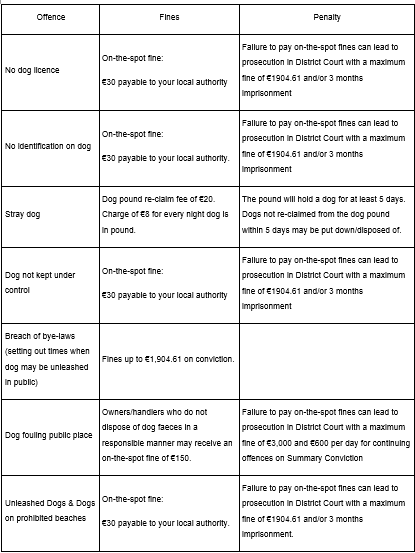This article on the DSPCA (Dublin Society for the Prevention of Cruelty to Animals) website sets out very clearly the legal responsibilities for dog owners in Ireland, and the potential penalties for failing to comply.
DSPCA - Dog Owners Legal Responsibilities Ireland
http://www.dspca.ie/index.jsp?p=161&n=243
As a dog owner you have many legal responsibilities. Penalties for non-compliance can include fines or imprisoned.
In addition to the Gardai, Local authorities have the power to appoint dog wardens, provide dog shelters, seize dogs, impose on-the-spot fines and take court proceedings against owners.
You are liable for injury or damage caused by your dog to people or livestock.
Dog Licences
In order to obtain a dog licence, you must be over 16 years of age.
It is an offence for you to keep a dog unless you have a licence.
All dogs over four months must have a licence.
Puppies under four months who are still with their mothers don't require licences but once they leave their mothers they must have a licence.
Your dog must be accompanied by and be under your effective control or the control of another responsible person if it is outside your home or premises or the home or premises of the person in charge of it.
You can be requested by a dog warden to produce evidence of your dog licence and failure to do so can result in an on-the-spot fine.
Failure to pay this fine within a specified period can result in prosecution by your local authority.
Licences are not required for dogs in the possession of the County Council, the DSPCA, Gardaí, blind persons' guide-dogs, and any dog imported into the State for less than 30 days.
Licences are valid for one year.
Dog licences are issued by your post office or your local authority. The revenue from dog licences finances the operation of dog control services in local areas throughout the country.
- Individual – covers one dog for a period of 12 months - €20
- General – for owners of kennels for a period of 12 months - €400
- Lifetime – for the lifetime of the dog for which the licence is issued - €120
Dog Identification
Dogs must at all times wear a collar that bears the name and the address of the owner inscribed on it or on a plate, badge or disc. Failure to have identification on a dog can result in an on-the-spot fine issued by a dog warden. Failure to pay this fine within a specific period can result in prosecution by your local authority.
Stray Dogs
Stray dogs are dogs that are in a public place and are not accompanied by the owner or a responsible person. Dogs that are not under proper control are also considered stray dogs. You can receive an on-the-spot fine if your dog is not under proper control.
Dog Wardens
Dog wardens have the power to request the name and address of a person suspected of an offence under the Control of Dogs Act. They also have the power to seize and detain any dog and to enter any premises, other than a residence with 5 or more dogs, to seize and detain a dog.
You are guilty of an offence and can be arrested by a Garda if you obstruct a dog warden in the course of his or her work, refuse to give your name and address or give a false name and address.
Bye-laws
Many local authorities have introduced bye-laws to indicate areas where dogs must be kept on a leash or even prohibited. Your local authority will be able to inform you of the bye-laws that apply in your area.
Breaches of these bye-laws relating to dogs in your area can result in fines on summary conviction.
Dog Faeces
Under our litter laws it is an offence to allow a dog under your control to foul a public place. This means the owner/person in charge of the dog is required under this law to remove dog faeces and dispose of it in a suitable, sanitary manner.
Barking Dogs
Excessive dog barking that causes a nuisance is an offence. Your District Court can make an order requiring the reduction of excessive barking by a dog, can limit the number of dogs that can be kept on a premises or can direct that a dog be delivered to a dog warden as an unwanted dog.
Rules relating to certain breeds of dog
The Control of Dogs Regulations 1998 (S.I. No. 442 of 1998) impose additional rules in relation to the following breeds (and strains/cross-breeds) of dog in Ireland:
- American Pit Bull Terrier
- English Bull Terrier
- Staffordshire Bull Terrier
- Dobermann Pinscher
- German Shepherd (Alsatian)
- Rhodesian Ridgeback
- Japanese Tosa
- Japanese Akita
- Rottweiler
- Bull Mastiff
- Bandog
The rules state that:
- These dogs (or strains and crosses of them) must be kept on a short strong lead by a person over 16 years who is capable of controlling them
- These dogs (or strains and crosses of them) must be muzzled whenever they are in a public place
- These dogs (or strains and crosses of them) must wear a collar bearing the name and address of their owner at all times.
The rules on muzzling and leashing do not apply to dogs used by the Gardaí, the Dublin Harbour Police, State Airport Police and bona fide rescue teams in rescue operations.
The rules on muzzling do not apply to guide dogs for the blind.
Penalties
Your local authority has the power to introduce bye-laws relating to dog control in your area. You should be aware that the penalties listed below are a guide; fines in your area may be higher.














